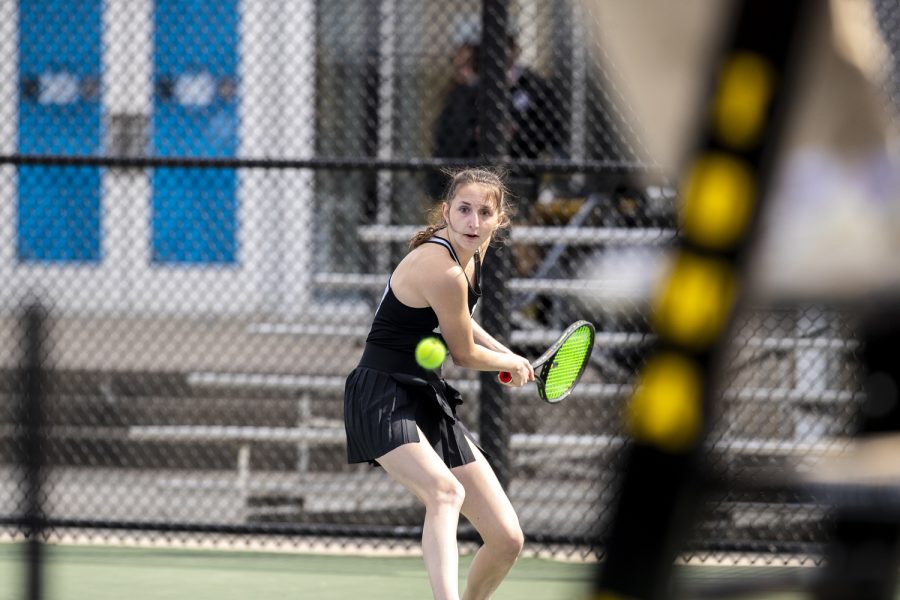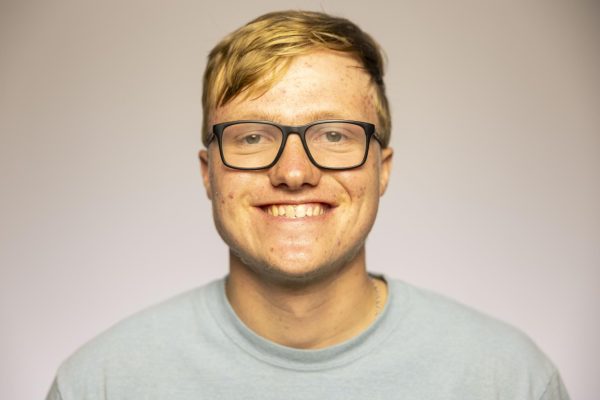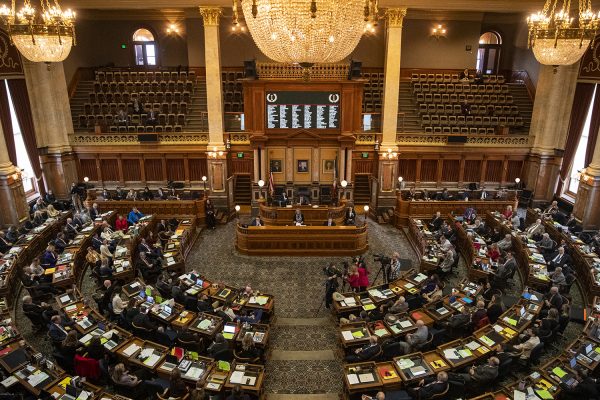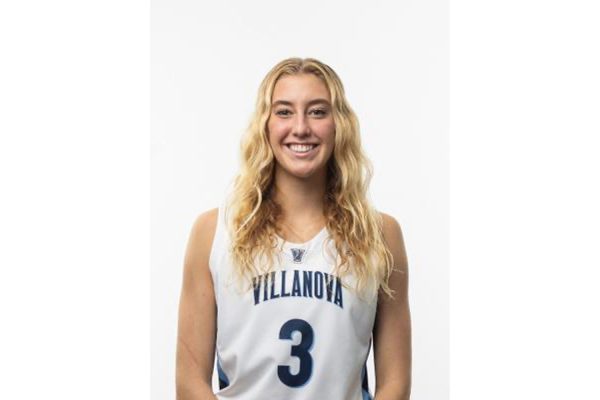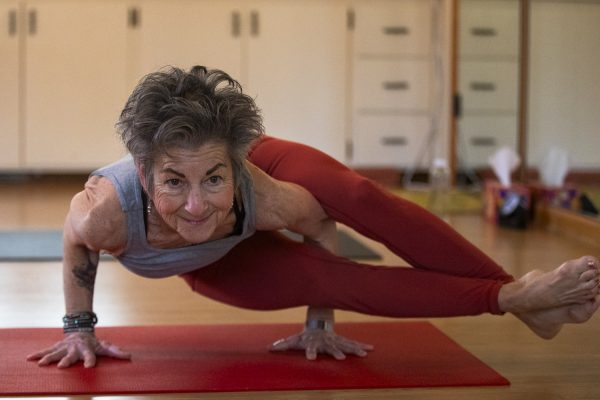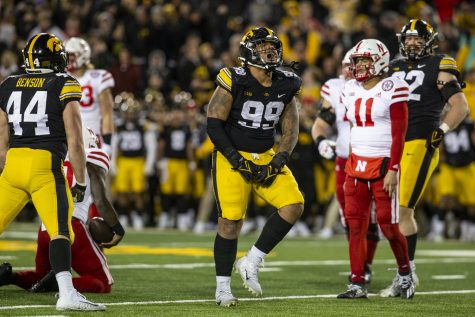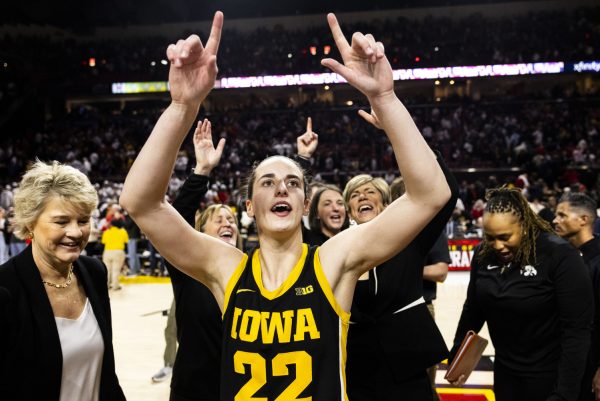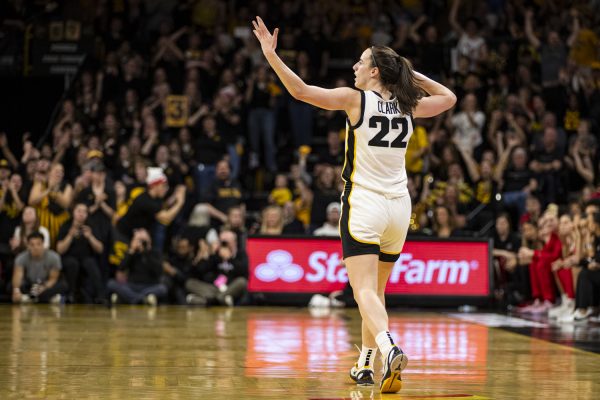Iowa’s international tennis players create global presence
With players from Germany, the Czech Republic, Peru, and India, the team creates a diverse, fun environment by sharing cultural backgrounds.
Iowa’s Marisa Schmidt eyes the ball during a women’s tennis match between Iowa and Michigan State at the Hawkeye Tennis & Recreation Complex on Wednesday, April 27, 2022. The Hawkeyes defeated the Spartans, 4- 3.
August 29, 2022
Iowa tennis sophomore Barbora Pokorna entered a new realm of tennis in the U.S. when she first stepped on the court at the Hawkeye Tennis and Recreation Complex.
Pokorna is 4,000 miles away from her native Ostrava in the Czech Republic, but she isn’t alone in her international endeavor.
Tennis is a global sport, and such globalization is evident with the 2022-23 Iowa women’s tennis team. The Hawkeyes have five international players on this year’s roster, who have all faced unfamiliar situations while in the U.S.
One of the major challenges for Pokorna during her first year in the U.S. was simply playing doubles. She said she barely played the two-on-two mode of tennis in the Czech Republic and playing close to the net was uncomfortable at first.
“It can be scary because the ball moves so fast. I got hit on the ribs a couple of times,” Pokorna said. “But I improved so much, and now I think I enjoy doubles more than singles.”
Freshman Daianne Hayashida not only had to acclimate to playing doubles, but also moving on a hard-court surface. Back in her hometown of Lima, Peru, Hayashida played tennis four hours a day on a clay surface.
Hayashida said she is a lot more mobile playing on clay compared to hardcourt. Pokorna agreed, saying she had to adjust her footwork and body positioning to better her timing without being able to slide.
“Hardcourt is so much faster; with clay you have time [to return the ball],” Hayashida said. “Here [in the U.S.] you always have to be super ready, you can’t slide your feet like I did all the time on clay. Here I was like, ‘I can’t move.’”
For a lot of international players, their first years at Iowa are usually their first time playing in a team environment. Secondary schools outside of the U.S. usually lack high school tennis teams, they each played for an outside club or represented their country — usually through individual tournaments.
Map by Ryan Hansen/The Daily Iowan
Sophomore Marisa Schmidt, born and raised in Karlsruhe, Germany, finds a team concept refreshing.
“It was nice. From the first moment on I really liked my teammates and my coaches, but it was different to practice all the time as a team and spend so much time with just one team,” Schmidt said. “There’s not as much individual pressure, but sometimes I just want to win more badly because I just want to win for the team.”
RELATED: Iowa women’s tennis ends season with loss to No. 48 Illinois in Big Ten Tournament
Moving between countries is hardly new for junior Vipasha Mehra. Born in Chennai, India, Mehra said that her father’s banking job required several relocations throughout her life, including stops in London, Doha, Dubai, and Calgary.
She said her experience living around the world allows her to easily interact with her new teammates and learn about their cultural backgrounds.
“I’ve been learning so much German in the past few weeks,” Mehra said. “It’s really nice to have teammates where we can just discuss how things work in our countries.”
Pokorna said learning different languages allows crucial team bonds to form, whether that is by teaching curse words in their native languages or creating a playlist featuring Czech rap, Spanish songs, and German music.
“I think it’s great to have people from all around,” she said. “We can try to learn each other’s languages, we listen to music from our countries, and we all have accents. I think it’s great to be so diverse.”
Mehra said these bonds create chemistry and trust on and off the court. In the long run, she said, trust is what leads to victory and championships.
“We are all honest and accountable with one another,” Mehra said. “[my teammates] are my best friends."



